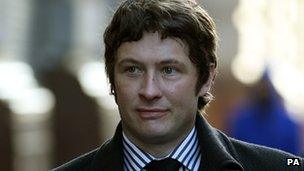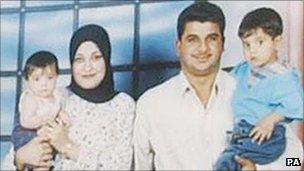Doctor Derek Keilloh ruled 'dishonest' over death of Iraqi detainee
- Published

Dr Derek Keilloh denied making untrue statements about the 2003 case
A former army medic has been found guilty of misleading and dishonest conduct after the death of Iraqi detainee Baha Mousa in 2003.
Dr Derek Keilloh, from Aberdeen, was serving as a medical officer with the Queen's Lancashire Regiment in Basra.
Mr Mousa died with 93 injuries in British army custody.
The Medical Practitioners Tribunal Service ruled Dr Keilloh was aware of the injuries but failed to report them or examine other detainees.
Dr Keilloh had told the hearing, being prosecuted by the General Medical Council, there were no visible injuries as he tried to treat Mr Mousa before confirming his death.
Mr Mousa had been hooded with a sandbag for nearly 24 hours and suffered 93 injuries, including fractured ribs and a broken nose, during the final 36 hours of his life in the custody of the Queen's Lancashire Regiment.
Dr Keilloh had claimed he only spotted dried blood around the nose of the 26-year-old hotel receptionist.
The GP faced the misconduct hearing over allegations that he failed to ensure written records were made of medical examinations of civilian detainees.
He was also accused of failing to examine Mr Mousa, a father of two, not checking the condition of other detainees and not notifying senior officers about mistreatment.

Baha Mousa died while in British custody in Iraq in 2003
The tribunal had heard Dr Keilloh was 28 at the time of the incident and new to his post, having been in the job eight weeks.
The doctor, who now works at Mayford House Surgery in Northallerton, North Yorkshire, had denied a cover-up but was found guilty of a series of failures.
He was found to have known of the dead man's condition, failed to have assessed other detainees or protect them from further mistreatment and not told senior officers what was going on.
The Medical Practitioners Tribunal Service said he engaged in "misleading and dishonest" conduct when, at courts martials and a subsequent public inquiry, he maintained under oath he saw no injuries to Mr Mousa's body.
The tribunal will now retire to decide whether his behaviour amounts to misconduct, and if so, what the penalty should be.
It has the power to suspend or strike off doctors they find guilty of misconduct.
General Medical Council lawyers asked for time to digest the findings and the panel will sit again on Monday.
Lawyers for Dr Keilloh said he would make no comment while the hearing was ongoing.
The panel ruled that while the injuries to Baha Mousa and others were the responsibility of British soldiers, there were "clearly failings by others with responsibility towards the detainees to have safeguarded their welfare".
A public inquiry concluded Mr Mousa's death was caused by a combination of his weakened physical state - due to factors including the heat, exhaustion, his previous injuries and the hooding and stress positions he was subjected to by British troops - and a final struggle with his guards at the detention centre at Army HQ in Basra.